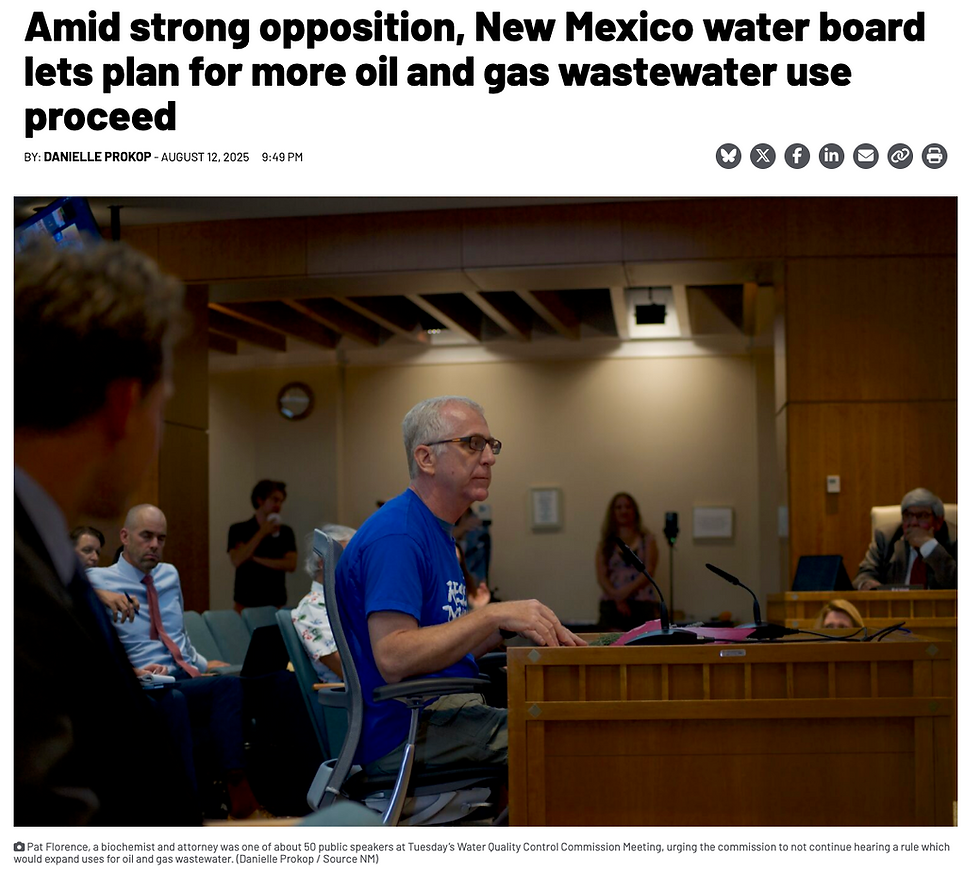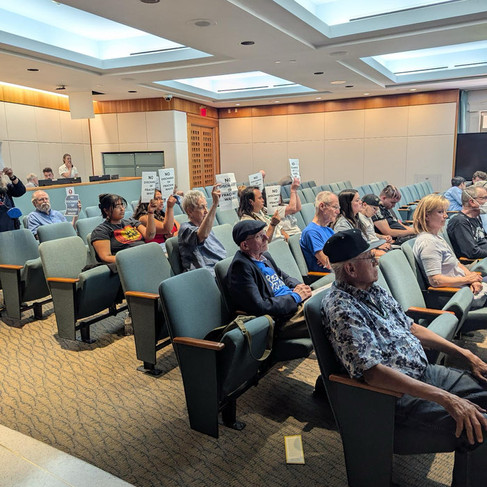The Water Quality Control Commission Just Caved to Polluters. Help Us Fight Back.
- zoeyyucraft
- Aug 12
- 3 min read
Updated: Aug 27
This week, the Water Quality Control Commission caved to oil and gas industry pressure, voting to advance a petition that could open the door for dumping toxic, radioactive fracking waste into our rivers, acequias, and even our drinking water.
This dangerous move puts the protections we spent 18 months fighting for back on the chopping block – and we need everyone in this fight.
WATER QUALITY CONTROL COMMISSION CAVES TO INDUSTRY PRESSURE: WHAT'S NEXT IN THE FIGHT TO PROTECT OUR WATER

In May, after months of expert testimony, public hearings, and overwhelming community opposition to the oil and gas industry’s push to legalize so-called “produced water reuse”, the Commission passed a strong Wastewater Reuse Rule (WQCC 23-84). This critical rule was designed to protect our water by prohibiting the discharge or reuse of "produced water" off the oilfield, because there's no credible scientific evidence that produced water is safe for human health or the environment – even after "treatment".
In fact, produced water contains more than 1,400 toxic substances, including heavy metals, radioactive materials, and toxic organic compounds, and current water quality standards don’t even measure for all of them.
But now, the so-called WATR Alliance – made up of the same industry insiders who fought against the rule – wants to undo the protections we just won. And instead of defending their own rule, the Commission (appointed by and accountable to the Governor) just handed industry a total do-over.
During more than 3 hours of public comment at the WQCC hearing earlier this week, over 50 speakers – from concerned residents to legislators, farmers, public health experts, faith leaders, environmental justice groups, and young people – told them the same thing: we don't want toxic fracking waste in our water. You can watch highlights from the powerful testimony opposing industry's petition above. ⬆️
But despite this overwhelming community opposition, the Commission rejected motions from our movement allies to dismiss the WATR Alliance's baseless petition, to reconsider their vote, and even to form a diverse advisory committee.
In response to the Commission’s decision, YUCCA Program Coordinator Vittoria Judy said:
“As young people, we’re extremely disappointed that the Commission chose to side with polluters. The recently passed Wastewater Reuse Rule was won through months of evidentiary proceedings and stakeholder engagement with participation from credible experts, diverse community members, and even legislators. No amount of rebranding or pressure from the oil and gas industry should undo that. The industry’s toxic waste crisis is not our problem to solve, and if regulators won’t protect us, we’ll keep fighting to defend our water and our future.”
This decision isn't about following the science. It's about oil and gas working hand-in-hand with the Governor's administration to rebrand the oil and gas industry's toxic waste problem as a "water solution" and push a dangerous produced water agenda. If they succeed, fracking waste could end up in our water with no proven way to make it safe again, and damage that could last for generations.
Right now, the vast majority of this waste is injected underground, contributing to earthquakes in the Permian Basin and prompting stronger regulation from both Texas and New Mexico, and industry is desperate for another disposal method.
But the industry's toxic waste crisis isn't our communities' problem to solve. And if regulators won't step up to protect our communities, we will. YUCCA and our allies will keep organizing and keep fighting to defend our water, our land, and our futures – and we need you with us.
Send an email to WQCC Chair Bruce Thompson and Administrator Pamela Jones now to hold the Commission accountable for siding with polluters over our communities, and stay tuned for more updates and ways to take action – because “produced water” isn’t water. It’s toxic radioactive waste.








Comments